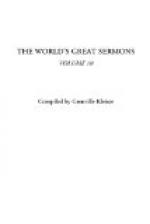This book was to produce the edict of Nantes, while John of Barneveld would give new life to the command of William the Silent—“Level the dikes; give Holland back to the ocean, if need be,” thus making preparation for the visit of the Mayflower pilgrims to Leyden or Delfthaven. Their eyes resting upon its pages, Selden and Pym were to go to prison, while Grotius dreamed of the rights of man in peace and war, and Guido and Rubens were painting the joys of the manger or the sorrows of Calvary. His hand resting upon this book, Oliver Cromwell would consolidate the hopes and convictions of Puritanism into a sword which should conquer at Nasby, Marston Moor and Dunbar, leave to the throne of Charles I, a headless corpse, and create, if only for an hour’s prophecy, a commonwealth of unbending righteousness. With that volume in their homes, the Swede and the Huguenot, the Scotch-Irishman and the Quaker, the Dutchman and the freedom-loving cavalier, were to plan pilgrimages to the West, and establish new homes in America. With that book in the cabin of the Mayflower, venerated and obeyed by sea-tossed exiles, was to be born a compact from which should spring a constitution and a government for the life of which all these nationalities should willingly bleed and struggle, under a conqueror who should rise from the soil of the cavaliers, and unsheath his sword in the colony of the Puritans.
Out of that Bible were to come the “Petition of Right,” the national anthem of 1628, the “Grand Remonstrance,” and “Paradise Lost.” With it, Blake and Pascal should voyage heroically in diverse seas. In its influence Jeremy Taylor should write his “Liberty of Prophesying,” Sir Matthew Hale his fearless replies, while Rembrandt was placing on canvas little Dutch children, with wooden shoes, crowding to the feet of a Jewish Messiah.
Its lines, breathing life, order, and freedom, would inspire John Bunyan’s dream, Algernon Sidney’s fatal republicanism, and Puffendorf’s judicature. With them, William Penn would meet the Indian of the forest, and Fenelon, the philosopher, in his meditative solitude. Locke and Newton and Leibnitz would carry it with them in pathless fields of speculation, while Peter the Great was smiting an arrogant priest in Russia, and William was ascending the English throne. From its poetry Cowper, Wordsworth, Tennyson, and Browning would catch the divine afflatus; from its statesmanship Burke, Romilly, and Bright would learn how to create and redeem institutions; from its melodies Handel, Bach, Mendelssohn, and Beethoven would write oratorios, masses, and symphonies; from its declaration of divine sympathy Wilberforce, Howard, and Florence Nightingale were to emancipate slaves, reform prisons, and mitigate the cruelties of war; from its prophecies Dante’s hope of a united Italy was to be realized by Cavour, Garibaldi, and Victor Emmanuel. Looking upon the family Bible as he was dying, Andrew Jackson said: “That book, sir, is the rock on which the Republic rests”; and with her hand upon that book, Victoria, England’s queen, was to sum up her history as a power amid the nations of the earth, when, replying to the question of an ambassador: “What is the secret of England’s superiority among the nations?” she would say: “Go tell your prince that this is the secret of England’s political greatness,”




